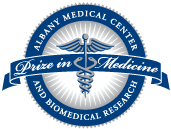The 2013 Albany Prize
 Three physicians/scientists who worked on the development of targeted drugs for cancer treatments are the winners of this year's Albany Medical Center Prize in Medicine and Biomedical Research. At $500k, it's one of the biggest science prizes in the nation.
Three physicians/scientists who worked on the development of targeted drugs for cancer treatments are the winners of this year's Albany Medical Center Prize in Medicine and Biomedical Research. At $500k, it's one of the biggest science prizes in the nation.
From the announcement:
This year, the prize will recognize groundbreaking research into the nature of cancer, which has led to the development of a new generation of cancer drugs, most notably Gleevec for chronic myeloid leukemia that, unlike chemotherapy, target specific genetic defects causing cancer.
The recipients are:
+ Peter C. Nowell, M.D., University of Pennsylvania, whose discovery of the "Philadelphia chromosome" in chronic myeloid leukemia established that genetics could be responsible for cancer. + Janet D. Rowley, M.D., University of Chicago, a geneticist who The New York Times called "the matriarch of modern cancer genetics."
+ Brian J. Druker, M.D., Oregon Health & Science University, an oncologist whose research to develop Gleevec saved countless lives and opened the door for more targeted cancer therapies.
You know how people/the media always talk about the promise of genomics for helping to treat diseases? Gleevec is among the most notable examples of that approach.
Brian Druker shared a good explanation of how with the New York Times in 2009:
The way I'd been trained, cancer was seen as something like a light switch that was stuck in an "on" position. You were given a baseball bat, which was chemotherapy, and told to knock the light out with the bat. I thought, "Why don't we just try to figure out why the light is stuck on, then we can fix it without breaking everything."
So I started my laboratory career studying the regulation of cell growth -- what turns the switch on, what helps it shut down. And that's how Gleevec is different from earlier chemotherapies, which basically poisoned every cell in the body in an attempt to kill the cancer. Gleevec turned off the light switch and only killed the cancer cells.
And when researchers tested Gleevec in patients with a specific type of leukemia (CML), it worked almost unbelievably well. Many people who were almost certainly facing death have gone on to live long lives.
So Gleevec is a big deal because it was an early example of how the machinery of cancer could be jammed very specifically without hurting other cells.
Great, it's the cure for cancer, right? Unfortunately, it's not the cure for cancer -- it's a cure for a specific type of cancer. And that highlights one the reasons cancer has been so hard to treat -- there are many different types of cancers, with different molecular processes. And the challenge is to find the light switch for each one.
The Albany Prize is funded through a $50 million donation made by philanthropist Morris "Marty" Silverman in 2000. This is the 13th year the prize has been awarded. Last year's award went to a two scientists for their research into how instructions in DNA are copied and transmitted to other parts of the cell.
... said KGB about Drawing: What's something that brought you joy this year?